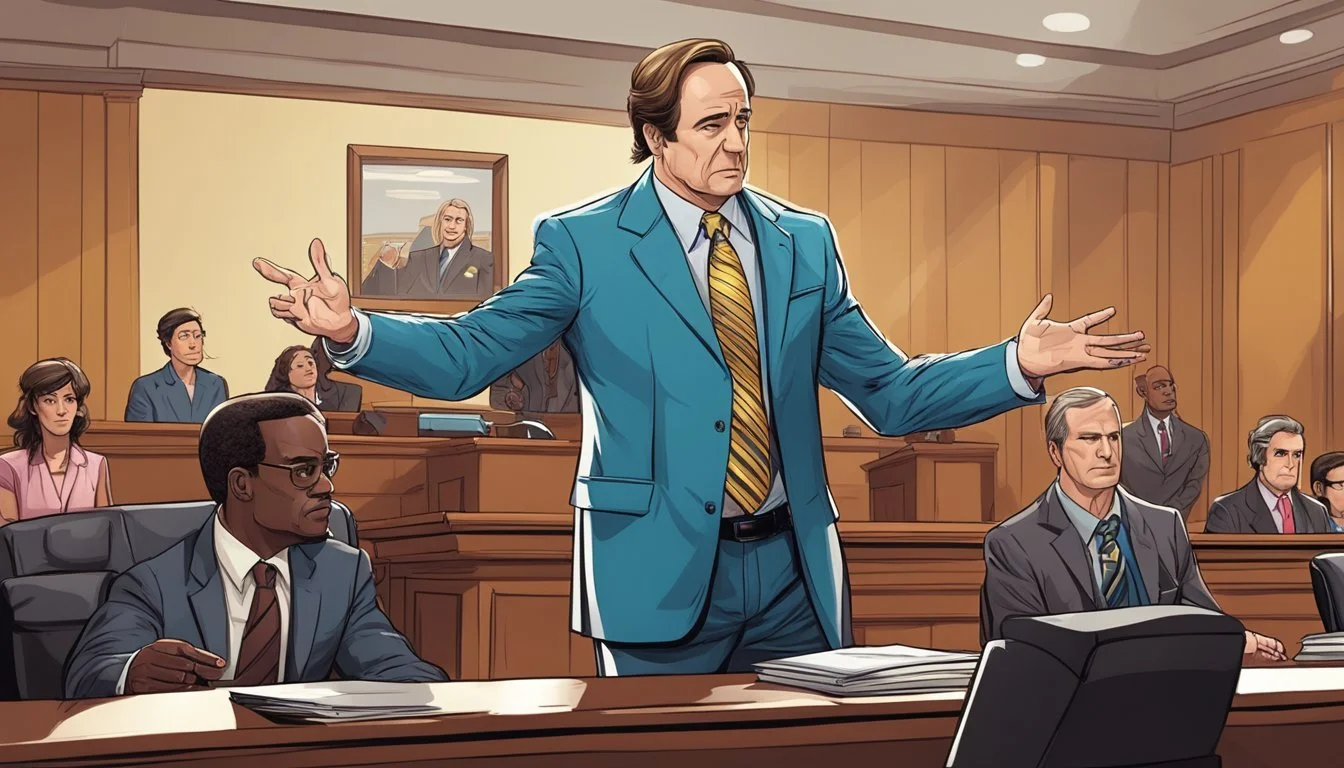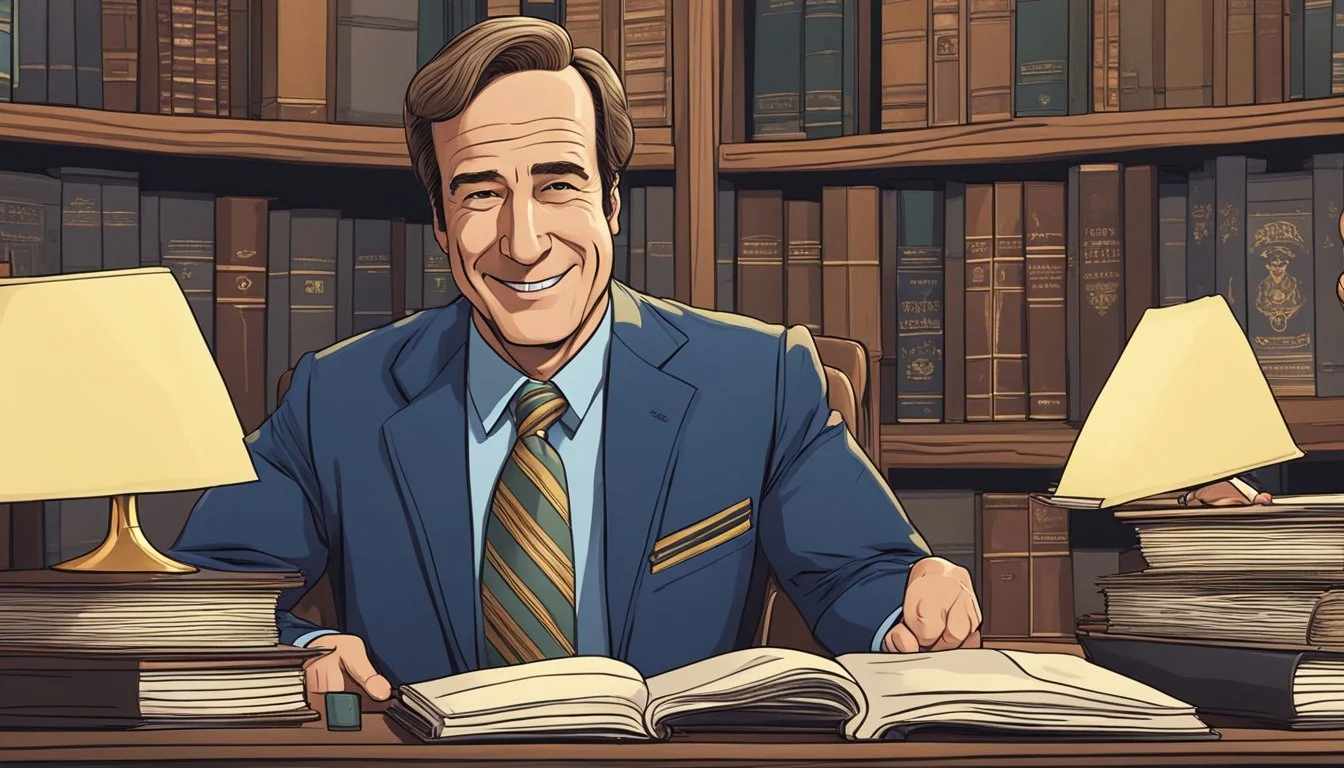Saul Goodman: The Ethics of a Criminal Lawyer in Breaking Bad
Examining Moral Ambiguity in Legal Practice
Saul Goodman, the flamboyant criminal lawyer from Breaking Bad and Better Call Saul, captivates audiences with his quick wit and questionable ethics. Portrayed brilliantly by Bob Odenkirk, Saul navigates the murky waters of criminal defense, often blurring the lines between legal and illegal.
Saul's deep understanding of criminal law, coupled with his adaptability, makes him a formidable attorney despite his unethical practices. His journey from Jimmy McGill to Saul Goodman showcases a gradual moral descent, as he embraces increasingly dubious tactics to win cases and protect his clients.
While Saul's methods may be morally ambiguous, his character raises important questions about the nature of zealous advocacy in criminal defense. His popularity among viewers stems from his charisma and ability to navigate complex legal situations, even as he pushes ethical boundaries to their limits.
Saul Goodman: From Jimmy McGill to Albuquerque's Criminal Lawyer
Jimmy McGill's transformation into Saul Goodman marked a pivotal shift in Albuquerque's legal landscape. His journey from small-time con artist to criminal lawyer intertwined with the city's growing methamphetamine trade.
Evolution of Jimmy McGill
Jimmy McGill started as a public defender in Albuquerque, New Mexico. Born on November 12, 1960, in Cicero, Illinois, he moved to Albuquerque to escape his past as a scam artist.
Initially, Jimmy struggled to establish himself as a legitimate lawyer. He lived in the shadow of his successful older brother, Chuck, a renowned attorney.
Jimmy's early career was marked by unorthodox methods and a willingness to bend rules. He often took on pro bono cases and elder law, gradually building a reputation.
Establishing Goodman and Associates
Jimmy McGill adopted the alias "Saul Goodman" to attract a different clientele. The name, a play on "It's all good, man," became his professional identity.
Saul set up Goodman and Associates, marketing himself as a criminal lawyer who could navigate legal gray areas. His colorful TV ads and billboard stunts quickly made him recognizable.
His office, adorned with Constitution-themed decor, became a hub for clients seeking unconventional legal solutions. Saul's practice grew, attracting both petty criminals and more serious offenders.
Albuquerque and the Methamphetamine Scene
Saul Goodman's rise coincided with Albuquerque's growing methamphetamine trade. His reputation as a "criminal" lawyer made him attractive to drug dealers and manufacturers.
He became involved with cartel operations, even earning the title "Friend of the Cartel." Saul's services expanded beyond legal advice to money laundering and connecting criminals with hitmen.
His most notorious client was Walter White, a high school chemistry teacher turned meth kingpin. Saul helped launder White's drug money and provided crucial connections to expand his empire.
The Legal Tactics of Saul Goodman
Saul Goodman employs a variety of controversial legal strategies to defend his clients. His approach combines creative interpretation of laws, unorthodox methods, and quick thinking in court.
Exploiting Legal Loopholes
Saul Goodman excels at finding and utilizing legal loopholes. He meticulously studies statutes and precedents to identify ambiguities or gaps in the law. This allows him to construct defense strategies that, while technically legal, often push ethical boundaries.
Goodman frequently advises clients on how to structure their activities to minimize legal risk. He may suggest specific wording or actions that provide plausible deniability.
His expertise in criminal law enables him to anticipate prosecution tactics. Saul then crafts defenses that exploit procedural technicalities or evidentiary rules to benefit his clients.
Unconventional Methods in Defense
Saul Goodman's defense strategies often involve unconventional and questionable tactics. He is not above manufacturing evidence or creating distractions to sway juries.
Some of his methods include:
Staging elaborate scenarios to discredit witnesses
Using media manipulation to influence public opinion
Employing private investigators to dig up dirt on opponents
Leveraging personal connections with judges and law enforcement
Goodman also coaches clients on how to lie effectively under oath. He carefully crafts narratives that are difficult to disprove, even if they stretch the truth.
Adaptability in the Courtroom
Saul Goodman's courtroom performances showcase his quick wit and adaptability. He can swiftly adjust his arguments based on new information or unexpected developments during trials.
His rhetorical skills allow him to connect with juries on an emotional level. Goodman tailors his language and demeanor to appeal to different audiences.
He excels at thinking on his feet, often improvising creative objections or lines of questioning. This adaptability keeps opposing counsel off-balance and can turn seemingly hopeless cases in his favor.
Goodman's flexible approach extends to plea bargaining. He skillfully negotiates with prosecutors, leveraging his knowledge of their caseloads and personal motivations to secure favorable deals for clients.
Ethical Dilemmas and Moral Flexibility
Saul Goodman's legal career is rife with ethical challenges and moral compromises. His actions frequently test the boundaries of professional conduct and legal ethics.
Balancing Morality and Advocacy
Saul Goodman's approach to legal representation often blurs ethical lines. He prioritizes client interests above all else, sometimes at the expense of moral considerations.
Goodman exploits legal loopholes and employs questionable tactics to secure favorable outcomes. This includes fabricating evidence, bribing officials, and manipulating witnesses.
His methods raise questions about the limits of zealous advocacy. While effective, they frequently violate the Rules of Professional Conduct governing attorney behavior.
Goodman's willingness to bend rules demonstrates a flexible moral compass. He justifies unethical actions as necessary to level an unfair playing field for his clients.
The Complexities of Legal Ethics
The character of Saul Goodman highlights the nuanced nature of legal ethics. His actions exist in a gray area between strict adherence to rules and outright criminality.
Goodman's familiarity with legal statutes allows him to skirt regulations while avoiding clear violations. He crafts elaborate schemes that push ethical boundaries without explicitly breaking laws.
His behavior raises questions about the effectiveness of current ethical guidelines in the legal profession. Goodman exploits ambiguities and loopholes in ways that challenge traditional notions of proper conduct.
The character serves as a cautionary tale about the potential for abuse within the legal system. His actions demonstrate how skilled lawyers can manipulate rules meant to ensure justice.
Confronting Conflicts of Interest
Saul Goodman routinely faces conflicts of interest in his legal practice. He often represents multiple clients with competing interests, violating ethical standards.
Goodman's involvement with criminal enterprises creates ongoing conflicts. He struggles to balance obligations to various clients while protecting his own interests.
His role as "friend of the cartel" exemplifies these ethical dilemmas. Goodman must juggle loyalties to drug lords, street-level dealers, and his own legal practice.
The character's handling of conflicts highlights the challenges of maintaining professional ethics in complex situations. Goodman's choices demonstrate the potential consequences of prioritizing personal gain over ethical behavior.
Relationships with Key Characters
Saul Goodman's web of connections spans both sides of the law. His interactions with clients and associates reveal the complexities of his character and the precarious nature of his position as a criminal lawyer.
Walter White's Criminal Enterprises
Saul becomes Walter White's legal advisor and accomplice in money laundering. He introduces Walt to key underworld figures, facilitating the expansion of his meth empire. Their relationship is marked by a mix of professional respect and mutual manipulation.
Saul often provides creative solutions to Walt's problems, such as suggesting the use of a laser tag business as a front. He also helps Walt navigate legal pitfalls and offers advice on dealing with rival drug dealers.
Despite his usefulness, Saul frequently finds himself at odds with Walt's increasingly volatile behavior. He attempts to maintain a balance between serving his client and protecting his own interests.
Jesse Pinkman's Troubled Partnership
Jesse's relationship with Saul is more turbulent than Walt's. Initially skeptical of Saul's methods, Jesse comes to rely on his legal expertise and connections.
Saul helps Jesse launder money and avoid detection by law enforcement. He also assists in Jesse's real estate ventures, including the purchase of his aunt's house.
Their interactions are often strained by Jesse's impulsive nature and drug use. Saul frequently finds himself mediating conflicts between Jesse and Walt, trying to keep their partnership intact for his own benefit.
Kim Wexler and Professional Boundaries
Kim Wexler, Saul's colleague and romantic partner, represents a moral counterpoint to his increasingly unethical behavior. Their relationship is complex, blending personal and professional elements.
As Saul delves deeper into criminal law, Kim struggles with the ethical implications of his actions. She often acts as his conscience, challenging his decisions and trying to steer him towards more legitimate practices.
Their dynamic shifts as Saul's reputation as a "criminal" lawyer grows. Kim's attempts to maintain professional boundaries become increasingly difficult, leading to tensions in their relationship.
Dealing with Mike Ehrmantraut
Mike Ehrmantraut, a former cop turned hitman, becomes a key contact for Saul in the criminal underworld. Their relationship is based on mutual benefit and a shared cynical worldview.
Saul relies on Mike's skills for surveillance, information gathering, and problem-solving. In turn, he provides legal cover and connections for Mike's activities.
Their interactions are characterized by a wary respect. Saul recognizes Mike's competence and danger, while Mike sees Saul as a useful but potentially unreliable ally.
As their dealings become more entangled with larger criminal operations, the stakes of their partnership increase, testing the limits of their professional arrangement.
Saul Goodman's Role in Prominent Cases
Saul Goodman's legal career involved several high-profile cases that showcased his unconventional methods and moral flexibility. His involvement ranged from elder law to drug-related offenses and financial crimes.
The Sandpiper Crossing Class Action
Saul Goodman, under his real name Jimmy McGill, uncovered a widespread fraud scheme at Sandpiper Crossing retirement homes. He initiated a class action lawsuit against the company for overcharging residents.
The case highlighted Goodman's resourcefulness and dedication to his clients. He meticulously gathered evidence by dumpster diving and gaining the trust of elderly residents.
Despite facing opposition from larger law firms, Goodman's persistence led to a substantial settlement offer. The Sandpiper case demonstrated his ability to take on corporate giants and secure justice for vulnerable clients.
Defending Drug Trafficking Charges
Goodman's expertise in criminal defense came to the forefront when representing high-profile drug traffickers. His most notable client was Walter White, a methamphetamine manufacturer and distributor.
Goodman employed various tactics to keep White and his associate Jesse Pinkman out of legal trouble:
Creating fake identities and alibis
Manipulating evidence
Bribing officials
Exploiting legal loopholes
His creative strategies often pushed ethical boundaries but proved effective in keeping his clients out of prison. Goodman's ability to navigate the complex world of drug-related crimes solidified his reputation as a "criminal" lawyer.
Money Laundering and Financial Crimes
Saul Goodman played a crucial role in facilitating money laundering operations for his criminal clients. He devised elaborate schemes to legitimize illegal profits from drug trafficking and other illicit activities.
Key money laundering strategies Goodman employed included:
Setting up shell companies
Utilizing cash-intensive businesses as fronts
Coordinating with offshore accounts
Structuring transactions to avoid reporting requirements
Goodman's expertise extended to tax evasion and fraud. He advised clients on hiding assets and manipulating financial records to evade detection by authorities.
His involvement in these financial crimes showcased his deep understanding of both legal and criminal worlds. Goodman's ability to seamlessly blend legitimate business practices with illegal activities made him an invaluable asset to his criminal clientele.
Saul Goodman's Legacy
Saul Goodman's character left an indelible mark on popular culture and the legal profession. His unique approach to criminal defense sparked debates on legal ethics and captivated audiences worldwide.
Influence on Criminal Defense Practice
Saul Goodman's unorthodox methods challenged traditional views of legal representation. His willingness to bend rules and exploit loopholes raised questions about the boundaries of zealous advocacy.
Some lawyers admired Goodman's creativity, while others criticized his disregard for ethics. His character sparked discussions on the role of criminal defense attorneys in protecting clients' rights.
Goodman's tactics influenced real-world legal strategies, with some lawyers adopting more aggressive approaches. This led to increased scrutiny of defense attorneys' methods and ethical guidelines.
Representation in Media by Vince Gilligan
Vince Gilligan's portrayal of Saul Goodman in Breaking Bad and Better Call Saul provided a nuanced look at the complexities of criminal law.
Gilligan crafted a character that was both entertaining and morally ambiguous. He explored the factors that led Jimmy McGill to become Saul Goodman, humanizing the often-vilified role of a criminal lawyer.
The shows delved into the pressures and ethical dilemmas faced by attorneys in the criminal justice system. Gilligan's work prompted viewers to consider the gray areas of legal practice and the motivations behind questionable actions.
Cultural Impact of 'Better Call Saul'
Better Call Saul elevated Saul Goodman from a supporting character to a cultural icon. The show's popularity led to increased interest in legal dramas and the inner workings of law firms.
Catchphrases like "Better Call Saul" entered everyday language, reflecting the character's impact on pop culture. Goodman's flamboyant persona and legal maneuvering became topics of water cooler conversations.
The series sparked discussions on the nature of justice, redemption, and the American legal system. It encouraged viewers to examine their own moral compasses and the complexities of right and wrong in challenging situations.
The Dichotomy of Saul Goodman
Saul Goodman embodies a complex duality, balancing his legal profession with a morally ambiguous past and present. His character arc spans from small-time con artist to criminal lawyer to a life in hiding.
Saul the Lawyer vs. Slippin' Jimmy
Saul Goodman's professional identity as a lawyer often clashes with his alter ego, Slippin' Jimmy. As an attorney, Saul demonstrates sharp legal acumen and a knack for creative problem-solving. He uses his knowledge of the law to benefit his clients, often bending rules to their breaking point.
In contrast, Slippin' Jimmy represents his con artist roots. This side of him emerges in unethical practices, such as fabricating evidence or manipulating witnesses. The tension between these two personas drives much of Saul's character development.
Saul's ability to switch between these identities showcases his adaptability. It also highlights the internal struggle between his desire for legitimacy and his inclination towards shortcuts and schemes.
Moral Compass in the Face of Crime
Saul Goodman's moral compass is constantly tested in his interactions with criminal clients. While he often justifies his actions as helping those in need, his choices frequently cross ethical boundaries.
His representation of drug lords and money launderers blurs the line between legal advocacy and criminal complicity. Saul's rationalization of these choices reveals a flexible morality that adapts to circumstances.
Despite his questionable ethics, Saul occasionally displays moments of conscience. These glimpses of moral clarity create a nuanced portrait of a man navigating a criminal underworld while grappling with his own sense of right and wrong.
Transition to Cinnabon Manager
The final transformation in Saul Goodman's journey is his new life as a Cinnabon manager under the alias Gene Takavic. This drastic change represents the consequences of his choices and the loss of his former identity.
As Gene, he lives in constant fear of discovery, a stark contrast to his once-flamboyant personality. This new existence forces him to confront the full weight of his past actions and the true cost of his choices.
The Cinnabon manager persona serves as a form of penance, stripping away the flashy lawyer facade and leaving a man haunted by his past. This transition completes the complex arc of Saul Goodman's character, from rising star to fallen anti-hero.
Conclusion: The Role of a Criminal Lawyer in Justice
Criminal lawyers play a vital role in the justice system. They ensure that defendants receive fair representation and that their rights are protected throughout legal proceedings.
These attorneys act as a safeguard against potential abuses of power by law enforcement and prosecutors. Their expertise in criminal law allows them to navigate complex legal issues on behalf of their clients.
Ethical considerations are paramount for criminal defense attorneys. They must balance zealous advocacy for their clients with adherence to legal and professional standards.
Criminal lawyers contribute to the overall fairness and integrity of the justice system. By providing competent legal counsel, they help maintain public trust in the legal process.
The portrayal of Saul Goodman in Breaking Bad highlights both the potential and pitfalls of criminal defense work. While his methods are often questionable, the character underscores the importance of legal representation for all defendants.
In reality, most criminal lawyers operate within ethical boundaries. They work diligently to protect their clients' rights while upholding the principles of justice and the rule of law.
The role of criminal lawyers extends beyond individual cases. They contribute to the development of legal precedents and help shape the interpretation of laws through their arguments and legal challenges.
Ultimately, criminal lawyers serve as a critical check on the power of the state. Their work ensures that every accused person has a voice in the courtroom and a chance at a fair trial.





